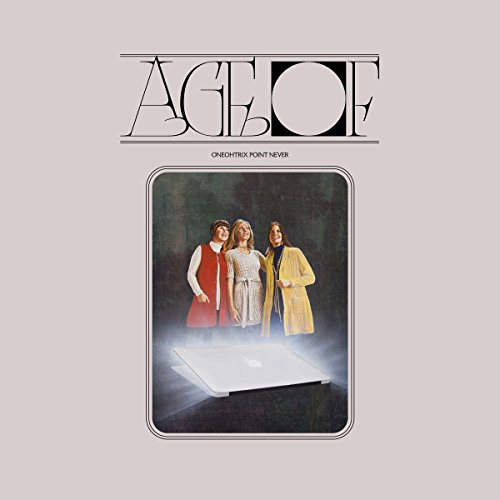
Oneohtrix Point Never
Age Of
Release Date: Jun 1, 2018
Genre(s): Electronic, Pop/Rock
Record label: Warp
Music Critic Score
How the Music Critic Score works
Buy Age Of from Amazon
Album Review: Age Of by Oneohtrix Point Never
Excellent, Based on 11 Critics
Based on rating 9/10
There are a few bands or musicians who could be said to have built up a universe in their work, and at this point there is veritably a Oneohtrix Point Never universe that Daniel Lopatin has been cultivating for some time now. In interviews he has always expounded on influences from both science fiction and science fact, which have, in the last few albums, come to characterise and inhabit his work. His now-trio of albums released on Warp have each come with a considerable back story affixed to them, a lens through which Lopatin would like you to experience them.
Based on rating 9/10
From the way Oneohtrix Point Never's early albums felt like vintage synth oddities to the '90s TV commercial-sampling Replica and the alt-rock-inspired Garden of Delete, Daniel Lopatin's music has always recontextualized sounds that seem to define an era. Where he previously confined himself to exploring a single period of time or combining a handful of elements, on Age Of it feels like he recombines the entire history of music in profound -- and surprisingly accessible -- ways. (In retrospect, his background as an archival science grad student makes perfect sense.) On the ninth Oneohtrix Point Never album, Lopatin makes a strong case for the pointlessness of stylistic boundaries.
Based on rating 4.0/5
Oneohtrix Point Never's ninth album is not a concept album, though it deals, variously, with the rise and fall of man, an allegorical story by the French writer François Rabelais and a plot about omniscient AI or aliens who want to be as dumb as humans. On Age Of, he also reinterprets a demo he made for Usher and works with ANOHNI, Kelsey Lu, Prurient and James Blake. Dan Lopatin retreated to an egg-shaped house in Massachusetts to make dense, proggy electronic music covering multiple concepts inspired by the endless digital torrent.
Based on rating 8/10
Drawing a following that spans noise-art chinstrokers to synth-pop fanatics and beyond, much of OPN's appeal can be attributed to his ability to consolidate emotion and intimacy within a kind of techno-dystopian nostalgia. Heavy sampling and sound manipulations congeal to create intensely evocative pieces, which can escalate from quiet poignancy to more frenetic, sometimes abrasive, sound collages. Many will have clocked OPN's intoxicating, texturally rich productions on his Rifts compilation or his last album, 2015's Garden of Delete.
Based on rating 8/10
A Daniel Lopatin album is always an occasion. For one, the fanfare generated by Lopatin, better known as Oneohtrix Point Never, is effective, like a masterfully played instrument. Secondly, the visual artistry accompanying the music is always as provocative and innovative as what it envelops. Age Of is, of course, a collaborative effort, with a number of featured vocalists, instrumentalists and a certain James Blake to help tie it all together. In the wrong hands, this cacophony of influences and contributors could fall into disarray ….
Based on rating 8/10
Oneohtrix Point Never presents a truly beguiling set with his ninth full-length effort, Age Of. That Daniel Lopatin is a relative veteran in the discography stakes should not indicate any mellowing or simplification of sound. Age Of is set in motion by dizzying harpsichord patterns on the title track, as it meshes with sparse rhythms, deep bass synths and contrasting arpeggios.
Based on rating 8/10
Age Of ….
Based on rating B+
To download, click "Share" and right-click the download icon | iTunes | Google Play | Stitcher | RSS The Lowdown: For Age Of, experimental composer Daniel Lopatin retreated to a curved glass house in the suburbs of Massachusetts, his own version of a "cabin in the woods," to craft an album of "nightmare ballads. " After spending over a decade confounding expectations through wildly inventive experiments, Lopatin breaks his own mold on Age Of by grounding vocals as the primary forefront of this record. Age Of is a dramatic left turn for the avant-garde composer that places moments of serene beauty alongside those of abject horror, making for Lopatin's most unsettling album yet.
Based on rating 7.8/10
In children's movies, the world is always ending. These worlds are smaller than our own, less complex and less fraught, but there is rarely an instance when they're not in crisis. The kingdom is freezing over, or the human race has been doomed, or God is getting ready to go off to college. When they come out of crisis, the worlds are fundamentally changed--kids' movies don't adhere to the trope of the action hero batting away disaster and everything going back to normal.
Based on rating 3/5
“One has to become a cybernetician to remain a humanist.” – Peter Sloterdijk T hat thirst, that desire. To present us multiple worlds that work indirectly, circuitously. To create sounds as sensing machines — shredding machines. To wander in a liminal or in-between space both fleeting and graspable, like the tangible heaviness of air on a humid day that fades after rain.
Opinion: Excellent
Electronic music is so often described with the same restrictive terminologies - around sci-fi, technology, the future - regardless of what it's actually trying to convey. Passion, lust, nature, sexuality and identity are as quintessential in electronic music as in any genre, but they're often missed in the discourse that surrounds it. Oneohtrix Point Never, or Daniel Lopatin, has been stuck with some of these preconceptions - his rise as an artist is highly indebted to internet culture but the profoundly human element to his music is often overlooked.
'Age Of'
is available now

